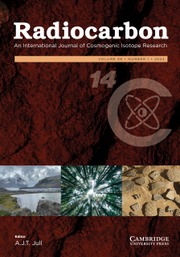Article contents
14C Measurements Elucidate Isotopic Differences between Nails and Hair in Modern Humans
Published online by Cambridge University Press: 26 July 2016
Abstract
In forensic sciences, radiocarbon found in modern human nails and hair is evaluated to determine the year of death. However, 14C analyses presented herein of fingernails and hair from the same infant demonstrated 14C values of hair that were lower than would be expected (e.g. depleted relative to the fingernails by at least 10‰). These results prompted a series of 14C measurements on infant hair strands, fingernails, and infant shampoo, which suggested the presence of C contamination due to cosmetic products. To further evaluate these discrepancies, several hair strands and fingernail samples from multiple donors were collected, pretreated by several approaches, and measured using isotopic analysis (δ13C, δ15N, and C/N as well as 14C accelerator mass spectrometry). SEM images of the surface of chemically pretreated hair strands were also taken to inspect the performance of the chemical pretreatments applied. Our 14C and stable isotope results show that modern human hair is likely contaminated with fossil-fuel-derived carbon, which is found in most hair care products. Currently, the various chemical pretreatments available in the literature and presented herein show that it is not possible to completely remove foreign carbon contaminates. Thus, the human 14C and δ13C values between keratinous tissues (fingernails and hair) arc not in agreement. From these observations, it becomes apparent that isotopic interpretations using human hair should be used with extreme caution and additional work is needed for its use in forensic and dietary research.
- Type
- Articles
- Information
- Copyright
- Copyright © 2014 by the Arizona Board of Regents on behalf of the University of Arizona
References
- 3
- Cited by


